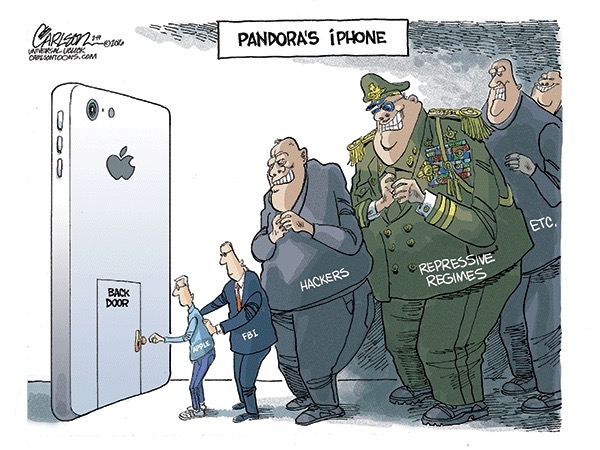Apple vs. FBI – a backdoor into Pandora’s box. A polarizing legal debate is engulfing the U.S. and beyond and has everyone talking privacy. Should Apple be forced to help the FBI unlock an encrypted iPhone belonging to a terrorist? The arguments are straightforward enough, but the ramifications and precedent they could set, undermine the very trust at the foundations of Silicon Valley. And, while it may seem that Apple is merely trying to protect its brand, the privacy implications (beyond people who have perpetrated horrible things) could open a technological Pandora’s box.
The iPhone in question was the work phone of Syed Rizwan Farook, who along with his wife, Tashfeen Malik, went on a shooting spree that killed 14 people in San Bernardino, California in December of 2015 (before they were shot down by police). The issue at hand is that FBI agents do not know the passcode to the phone, and face the risk of erasing all the data and turning the phone into a “brick” if they try to hack it (10 wrong codes and bye-bye data). But Apple also doesn’t have access to the passcode, as they began shutting themselves out of the encryption loop many years ago – to prevent exactly this type of situation. Apple can’t break the encryption on the phone, so the FBI has obtained a court order demanding Apple write special iOS software that would enable agents to “brute force” the device’s passcode and not lose the phone’s data. Apple CEO Tim Cook is refusing to cooperate. He has vowed to fight the order, saying that the software doesn’t exist and that creating it would set a new “dangerous precedent” and further iterates that it has “implications far beyond the legal case at hand,” potentially putting billions of iPhones at risk of being hacked or spied on by governments. Simply put – if Apple is forced to hack one iPhone, then where will it end?

Public sentiment is varied as to what should be done in this case since Apple was ordered to help the FBI crack the iPhone passcode. Pew Research Centre ‘s survey is getting the most attention, showing that 51% of Americans support the FBI, 38% support Apple, and 11% don’t know enough about the dispute to form an opinion. But opinion around the Internet is mixed with tech giants weighing in as well:
Sundar Pichai, CEO of Google , was the first major tech head to side with Apple, in a series of tweets saying, “forcing companies to enable hacking could compromise users’ privacy” and would set a “troubling precedent.”
Facebook quickly followed suit with more forceful language, warning of a “chilling precedent” and pledging to “fight aggressively” against government efforts to “weaken the security” of consumer tech products. Mark Zuckerberg volleyed from the stage at the Mobile Congress in Barcelona saying, “We’re sympathetic with Apple. We believe in encryption; we think that that’s an important tool.”
Twitter head Jack Dorsey posted that he supported the Apple CEO’s decision, tweeting: “We stand with @tim_cook and Apple (and thank him for his leadership)!”
And lest we forget, the world is watching… as the U.S. won’t be the only country wanting access to this extraordinary power. It just follows, that if the U.S. can possess it, why can’t China, or Russia, or any other global behemoth or repressive regime? Things get very tricky, very quickly, in this not so black and white arena – even when you just want a peek inside the box.
Michael
Michael Chase, CMO
St. Joseph Communications
RIPPED FROM THE HEADLINES – TAKEN FROM A VARIETY OF SOURCES, INCLUDING ZDNET (ZACK WHITTAKER) 2016, LA TIMES 2016, AND ASSOCIATED PRESS 2016
#Apple #FBI #iPhone #Privacy #PandorasBox
